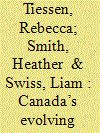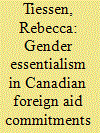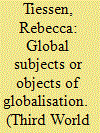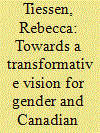|
|
|
Sort Order |
|
|
|
Items / Page
|
|
|
|
|
|
|
| Srl | Item |
| 1 |
ID:
175148


|
|
|
|
|
| Summary/Abstract |
This essay introduces a collection of articles on the lessons that can be drawn from Canada’s Feminist International Assistance Policy (FIAP) as Canada moves toward a more concrete and deliberate approach to feminist foreign policy. The articles in this collection provide insights into the challenges to be addressed, gaps to be filled, and the critical analyses necessary for expanding and enhancing Canada’s feminist foreign policy. The aim of the collection is to show that lessons learned from the FIAP can inform the design of Canada’s next steps in forging a formalized, comprehensive, and coherent feminist foreign policy. This introductory essay summarizes the five articles in this special section of International Journal on the FIAP and Canada’s feminist foreign policy and highlights their key findings.
|
|
|
|
|
|
|
|
|
|
|
|
|
|
|
|
| 2 |
ID:
137164


|
|
|
|
|
| Summary/Abstract |
Canada has made a wide range of commitments to the promotion of gender equality in development assistance programming. However, in its fragile states programs, these commitments have in fact promoted gender essentialism, treating women as victims of violence rather than as active agents of peace and development. Drawing on a comparative analysis of the National Action Plan on Women, Peace and Security arising from the passing of Security Council Resolution 1325 (2000) and on interviews conducted with a small sample of current and former Canadian government officials, this article documents and analyzes Canada’s comparatively weak and limited efforts to promote gender equality abroad under the Harper Conservatives, particularly for fragile and conflict-affected states. The research presented here is situated within broader feminist critiques of international relations and Canadian foreign policy, which document the centrality of gender equality to security and the role that international and national policies play in shaping gendered security dynamics.
|
|
|
|
|
|
|
|
|
|
|
|
|
|
|
|
| 3 |
ID:
105411


|
|
|
|
|
| Publication |
2011.
|
| Summary/Abstract |
Sport for Development and Peace (sdp) has been adopted as a 'development tool' by Western development practitioners and a growing number of development organisations. Sport is frequently referred to as a 'global language' and used to promote international awareness and cross-cultural understanding-two key themes in global citizenship literature. In this paper I examine the language adopted by organisations promoting sdp-specifically, what sdp organisations say they do as well as the nature and implications of their discourses. Drawing on a large and growing body of literature on global citizenship and post-structuralism, and on post-colonial critiques, I argue that sdp narratives have the potential to reinforce the 'Othering' of community members in developing countries and may contribute to paternalistic conceptions of development assistance. In so doing, they weaken the potential for more inclusive and egalitarian forms of global citizenship. The article examines the discourse of sdp organisational material found online and analyses it in the context of broader sport and colonialism literature. The work of SDP organisations is further examined in relation to global citizenship discourse with a focus on the production- and projection-of global subjects, or objects of globalisation, and what this means for development 'beneficiaries'.
|
|
|
|
|
|
|
|
|
|
|
|
|
|
|
|
| 4 |
ID:
192926


|
|
|
|
|
| Summary/Abstract |
In this paper, we consider the role of “feminist inside activists” in shaping the Canadian international policy landscape and provide examples of how government employees have actively promoted feminist and gender equality priorities. Specifically, this paper advances our understanding of how policy translates into action, and the transformative potential of agents of change in gender equality and feminist policy-making within Canada’s international policy machinery. Building on studies that identify the significant contributions of mid-level government employees who fight to keep gender equality a priority in government programming, we explore these contributions in the context of inside activism, documenting the significance of the work of both senior and mid-level government officials in advancing feminist policies and priorities. As an agency-focused analysis, this study complements and builds on critical feminist analyses of structural and systemic inequality.
|
|
|
|
|
|
|
|
|
|
|
|
|
|
|
|
| 5 |
ID:
175152


|
|
|
|
|
| Summary/Abstract |
Canada’s Feminist International Assistance Policy, introduced in 2017, is an ambitious and forward-thinking policy focussed on gender equality and women’s empowerment. The emphasis on a feminist vision, however, raises questions about how feminism is defined and interpreted by Canada’s partners in the Global South. In this article, we examine the interpretations of feminism(s) and a feminist foreign policy from the perspective of NGO staff members in East and Southern Africa. The research involved interviews with 45 Global South partner country NGO staff members in three countries (Kenya, Uganda, and Malawi). We consider the partner organization reflections on Canada’s Feminist International Assistance Policy using a transnational feminist lens. Our findings provide insights into future considerations for Canada’s feminist foreign policy priorities, consultations, and programme design.
|
|
|
|
|
|
|
|
|
|
|
|
|
|
|
|
|
|
|
|
|